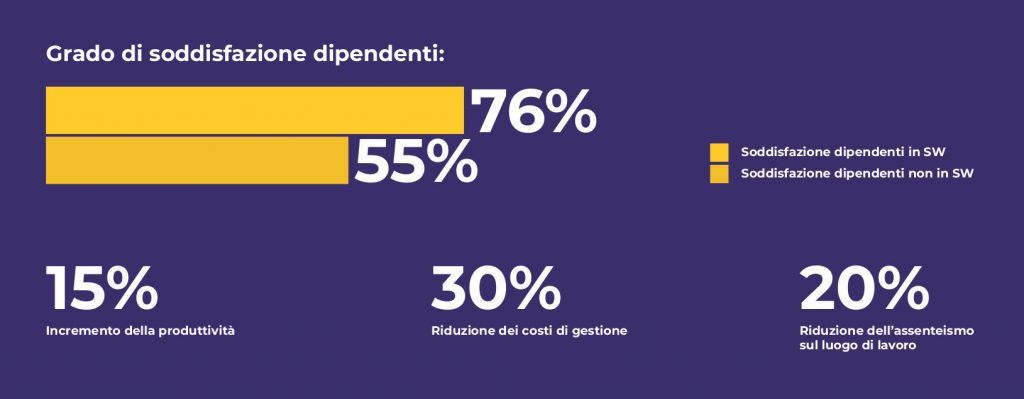Smart working is a way of working where technology is crucial and the concepts of time and space become less binding. The benefits are twofold: it can improve the quality of life of the worker while simultaneously increasing the competitiveness of a business.
Smart working has been a hot topic in Italy for around six years, but it was only legally introduced on 14 June 2017 by Law No.81/2017, which implemented “measures for the protection of non-entrepreneurial autonomous work and measures designed to promote flexible arrangements in terms of timings and locations for employed work” and set out an accepted definition of the practice.
The preventative measures introduced as a result of the coronavirus emergency in Italy have thrust smart working back into the spotlight, as the decree passed on 23 February 2020 called on Italians to work remotely as a way of fighting and containing the spread of COVID-19. Yet smart working isn’t just a useful strategy during times of quarantine.

Why it makes sense for workers
More flexibility in terms of when and where we work allows workers to manage their time and maintain a good work/life balance. Gone is the stress of having to clock in on time and dealing with a long commute to the office and back every day. You can work from anywhere – provided you have an internet connection – and the decrease in travel leads to a reduction in CO2 emissions. This all leads to increase serotonin in the body, while a brighter mood is linked to boosted productivity. According to the Milan Polytechnic’s Observatory on Smart Working, 76% of smart workers are satisfied with the jobs, against 55% of other employees.
Why it makes sense for businesses
While smart working undoubtedly does employees good, the real beneficiaries are businesses. The Milan Polytechnic’s Observatory on Smart Working has found that smart working can lead to an increase in productivity of around 15% per worker. On top of this, lack of a requirement to have virtually any physical workspaces cuts costs by 30%. As things stand, 40% of companies allow their employees to work wherever they like, though the most popular option is for employees to work from home (98%). There are plenty of workers who prefer to work on company premises (87%) or in co-working spaces (65%), while public spaces (60%) and client or supplier premises (56%) are also popular. The result is a non-stressful working environment which encourages smart workers to experiment, generate ideas and feel like integral parts of a collaborative system which ultimately improves working standards. One in three smart workers feel fully engaged in the organisations they work for and share their values, objectives and priorities, in comparison with just 21% for traditional workers.

GRAPH: Percentage of employee satisfaction for smart working compared with increased benefits for companies:
Level of employee satisfaction: SW employee satisfaction: 76% v. Non-SW employee satisfaction: 55%
Company benefits: Increased productivity: 15% Reduced running costs: 30% Reduced absenteeism: 20%
The current situation in Italy
Despite the fact that around 570,000 people in Italy currently engage in smart working, a 20% increase on the 2018 figure, our country still lags behind the European average. As things stand, just 3.6% of workers make use of smart working policies, compared with the European average of 5.2%, according to Eurostat data for 2018. It is heartening, however, to see that 58% of big companies implemented smart working policies last year, a slight increase on 2018. That said, the number of workers potentially eligible for smart working will be infinitely higher than the number of workers that actually practise it, with Eurostat data pointing to an actual number of just 359,000 against an eligible total of 8 million.
Smart working in the time of coronavirus
The COVID-19 emergency may well end up providing an opportunity for the spread of smart working and its benefits for employees and companies alike. The emergency measures brought in to fight the spread of the virus (Prime Ministerial Decree of 1 March 2020, later replaced by Prime Ministerial Decree of 4 March 2020) prompted both public and private employers to launch smart working policies. Though brought about by circumstance, this change in approach could be the thing that finally converts many companies still wedded to the idea of office-only working.



